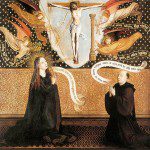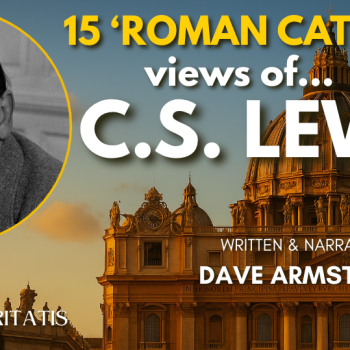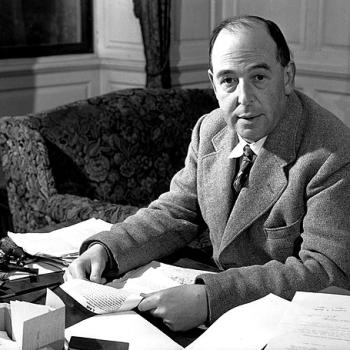If I was anything at all, religiously speaking, I was a nature mystic before I became an evangelical Protestant Christian in 1977. I relate to C. S. Lewis’ story in Surprised by Joy in many respects: the experiences of the painful, melancholy, yet “joyful” yearnings he calls sehnsucht, the fascination with mythology and fantasy, as exemplified in music by Wagner, Northernness, the Middle Ages, knights, castles, Camelot, fairy-tales, Robin Hood, Celtic mythology, etc. This is an idealized, mythological, parabolic, analogical, poetic thought-picture and “world” (in retrospect very “medieval” and Catholic).
I instinctively sensed the God-behind-nature, never wholly descending to paganism or pantheism (although I toyed with several brands of the occult). Lewis discovered to his surprise that Romanticism was a bridge leading to Christianity. That might be said to be true for me as well. Romanticism was and is very dear and special to me, and I think at bottom it is essentially Christian, whether consciously or not. What the true Romantic seeks can only be consummated within a Christian worldview and structure.
So when I first heard orchestral excerpts of Richard Wagner’s Ring of the Nibelungs in 1974 (for those unfamiliar with it, think of a musical version of Lord of the Rings), it was very much a religious, quintessentially romantic, indescribable, astounding mystical experience. Here was gorgeous, inspired music which immediately conjured up all these deep, mystical, other-worldly images which I found within myself from an early age. Beethoven had that effect, too, in a lesser fashion: his music was more abstract, not conjuring up images so much as the strivings and aspirations of man, dynamism, the will to overcome adversity (symbolized by his own ineffably tragic deafness), etc.
Beethoven’s Ninth Symphony in particular is nothing less than a testament to the human spirit, which is, of course, derived from God’s image, and one might say that it is almost a religious experience to hear it. An online acquaintance shared with me that she never felt God’s presence so undeniably as in certain points of Beethoven’s Ninth. I also experienced very much the same feeling upon first hearing Gustav Mahler’s First Symphony, a work likewise steeped in Germanic nature mysticism and Romantic wonder, in both its ecstatic and terrifying elements (and I first heard the triumphalistic last movement, for those who are familiar with this work).
C. S. Lewis, in his extraordinary autobiography Surprised by Joy, recounts experiences and thought-processes (during his nominally Christian days, between the ages of thirteen and fifteen) very similar to mine at the same period of my life – which in turn reinforces his contention that such experiences are well-nigh universal:
I had read . . . the words Siegfried and the Twilight of the Gods. What I had seen was one of Arthur Rackham’s illustrations to that volume. I had never heard of Wagner, nor of Siegfried . . . Pure “Northernness” engulfed me: a vision of huge, clear spaces hanging above the Atlantic in the endless twilight of Northern summer, remoteness, severity . . . and almost at the same moment I knew that I had met this before, long, long ago . . .
And with that plunge back into my own past there arose at once, almost like heartbreak, the memory of Joy itself, the knowledge that I had once had what I had now for years, that I was returning at last from exile and desert lands to my own country; and the distance of the Twilight of the Gods and the distance of my own past Joy, both unattainable, flowed together into a single, unendurable sense of desire and loss, which suddenly became one with the loss of the whole experience, which, as I now stared round that dusty schoolroom like a man recovering from unconsciousness, had already vanished, had eluded me at the very moment when I could first say It is. And at once I knew (with fatal knowledge) that to “have it again” was the supreme and only important object of desire . . .
All this time I had still not heard a note of Wagner’s music . . . I first heard a record of the Ride of the Valkyries. They laugh at it nowadays, and, indeed, wrenched from its context to make a concert piece, it may be a poor thing. But I had this in common with Wagner, that I was thinking not of concert pieces but of heroic drama. To a boy already crazed with “the Northernness,” whose highest musical experience had been Sullivan, the Ride came like a thunderbolt. From that moment Wagnerian records (principally from the Ring, but also from Lohengrin and Parsifal) became the chief drain on my pocket money . . .
“Music” was one thing, “Wagnerian music” quite another, and there was no common measure between them; it was not a new pleasure but a new kind of pleasure, if indeed “pleasure” is the right word, rather than trouble, ecstasy, astonishment, “a conflict of sensations without name.” . . . You will misunderstand everything unless you realize that, at the time, Asgard and the Valkyries seemed to me incomparably more important than anything else in my experience . . . More shockingly, they seemed much more important than my steadily growing doubts about Christianity . . . If the Northernness seemed then a bigger thing than my religion, that may partly have been because my attitude toward it contained elements which my religion ought to have contained and did not.
It was not itself a new religion, for it contained no trace of belief and imposed no duties. Yet . . . there was in it something very like adoration, some kind of quite disinterested self-abandonment to an object which securely claimed this by simply being the object it was . . . Sometimes I can almost think that I was sent back to the false gods there to acquire some capacity for worship against the day when the true God should recall me to Himself . . . Secondly, this imaginative Renaissance almost at once produced a new appreciation of external nature . . . I was always involuntarily looking for scenes that might belong to the Wagnerian world . . . But soon . . . nature ceased to be a mere reminder of the books, became herself the medium of the real joy. I do not say she ceased to be a reminder. All Joy reminds. It is never a possession, always a desire for something longer ago or further away or still “about to be.”
(Surprised by Joy, New York: Harcourt Brace Jovanovich, 1955, 72-73, 75-78)
His descriptions of what he felt upon hearing Wagner’s music (especially the Ring) are uncannily like my own experiences. It conjured up images in his head of “heroic drama . . . ecstasy, astonishment” and displayed “elements which my religion ought to have contained . . . very like adoration.” Lewis ends his extraordinary recollections by observing that he came across “the false gods there to acquire some capacity for worship against the day when the true God should recall me to Himself.”
I read this work of Lewis several years after my own stunning, quasi-religious encounter with Wagner’s music. I had never come across anything that so incredibly described my own interior feelings, that I was not able to verbalize (or possibly not even conceptualize) at all until I read Lewis, writing about almost identical experiences and feelings of his own.
Here was the meeting of music and religion (what is sometimes called “imaginative – or romantic – theology”), just as I had already experienced the intersection of architecture and stained glass with vague religious feeling, years earlier in my young life. If God can’t reach us through the mind and theology, He has many other ways. In my case, knowing my interests, He drew me to Himself via art, music, and nature.
In my own vague, ethereal, only half-conscious Romanticism — before I was educated enough to be able to understand, let alone articulate, Christian doctrines and dogmas — I subconsciously sought out religious experiences or intimations which transported me into “religious,” “mystical,” “supernatural,” “fantastic” realms. Romantic orchestral music (above all, Wagner) served this “secondary” function for me. Nature was another such medium. I found everything there symbolic and parabolic. The forest wilderness, for example, represented the “other,” the unattainable, the transcendent, the fairy-tale environment.
Of course I knew the reality was otherwise, but that is beside the point: sheer idealism and symbolism is what matters in such imaginings. Mountains and oceans also fulfilled this role in my fantasy-ruminations, as they have in countless works of literature, music, poetry, and painting.
Various mythologies and quasi-historical “worlds” played into this as-yet undefined mysticism: the “wild west,” colonial America, knights, Robin Hood and William Tell, King Arthur, Greek mythology, the American Indians, the ancient Egyptians, pristine ancient Ireland and its elves, the Scottish Highlands and its legends and ghosts, the Alps, the Black Forest and Rhine River in Germany, even some of the biblical figures (about whom I knew little), etc. I didn’t know how many other people possessed these feelings. Nor was I likely to inquire. I was happy to find out that my wife Judy felt much the same way (she loves Wagner, too), as did C. S. Lewis (per the above excerpts).
Alas, at that time I had no inkling of the fact that what has been called the “mythopoeic imagination” is deeply, profoundly Christian and substantially identical with the “medieval worldview.” Malcolm Muggeridge wrote about this symbolism in an article entitled “Nature is a Parable” (after a phrase from Newman):
Everything that happens to us or in connection with us, all the happenings in the world, great and small, the whole exterior phenomenon of nature and of life — all that amounts to God speaking to us, sending out messages in code, and faith is the key whereby we may decipher them. It sounds very simple, but it’s somehow difficult to convey exactly . . . Nature is speaking to us. It is a parable of life itself, a revelation of fearful symmetry . . .
(National Review, December 24, 1982, 1608)
The notion of nature being a parable (it is no coincidence that Jesus often utilized agricultural parables to illustrate principles of the kingdom of heaven) is also part and parcel of the Incarnation and its extension of sacramentalism. For God became man (John 1:1-5,14-18) and in so doing raised matter and particularly human flesh to untold heights. Thus creation bespeaks not only God’s existence as Creator, but also His ineffable glory, as we know from God’s own revelation (Romans 1:19-20).
Most of us could ascertain that apart from revelation by means of experiences and insights such as those described presently. But others, due to an improper upbringing, misfortune, misinformation, or rebellion (Romans 1:18-32) cannot (or, will not) see God in His creation, which — with us — awaits “redemption” (Romans 8:19-25).
In other words, I was experiencing God and Christianity on an unconscious level, by means of nature, fantasy, myth, and music. Christianity is the fulfillment of all this longing. C. S. Lewis often makes the argument throughout his works that such intense, painfully powerful yearnings within us are grounded in the fact that we were made for heaven. The fleeting pangs of nostalgia, melancholy, vivid dreams, idealism, the Quest, paradise, (deja vu?), etc. which so infect us are thus explained as having an origin in ontological, spiritual, divinely-ordained reality.
Not only that, I will speculate further (hopefully not excessively so) and submit that within all of us is an innate consciousness of immortality and a sense of “pre-existence” (as Wordsworth alludes to in his poetry): not in the monistic, eastern sense of reincarnation, but rather, in the idealistic Platonic sense of eternal existence in the omniscient mind of God, the First Cause, the Creator, in whom “we live and move and have our being” (Acts 17:28). Perhaps also we retain a consciousness of the Garden of Eden and the pristine, luminescent, perfect, unfallen paradisal earth, which reappears in frustratingly short-lived instances of the painful Nostalgia or sehnsucht which Lewis so marvelously describes.
Since orthodox Christianity accepts the notion of a corporate Fall of the entire human race (i.e., Original Sin – see 1 Corinthians 15:22), why would it not be possible for us to have some slightest hint and remnant within us of what we have lost? And this — if true — would be yet another one of the many ways in which God speaks to us and intimates that there is something much better that awaits us, both in this life (once a commitment to Christ is made), and especially in the next, where those of us who are to be saved shall at last be made perfect, receive our resurrected bodies, and live in utmost bliss worshiping God and enjoying the New Heaven and Earth and each other forever (Revelation 21:1-27, 22:1-5).
I strongly, passionately believe all this now, but back in the late sixties and early seventies (during roughly the ages of ten to twenty in my life), I was searching for the meaning which lay behind my “mystical” experiences and ruminations. I still vividly recall the profound, quasi-religious experience of 2001: A Space Odyssey and its incredible “light show” which represented a trip through eternity, time and space. I viewed this again on a wide screen last year, and the scene still has the capacity of leaving me (and many others) dumbstruck with awe. There is something behind all of that, which gives it its challenging, “spiritual” quality.
It was another religious experience brought on by the art of cinema and music, with philosophical and scientific aspects also added in. My inquisitive mysticism and curiosity were running wild. This was literally my “religion” in 1968, after the “dud” of my previous Methodist churchgoing experience. Hearing Wagner took it a step further six years later.
During this period I sought the transcendent and supernatural in the occult, ESP, the ouija board, telepathy, and an intense fascination with ghost stories and “unexplained happenings” (UFOs, Night Gallery, The Twilight Zone, One Step Beyond, The Outer Limits, etc.). Then I became interested in Eric von Daniken (sp?) and his Chariots of the Gods series of quack pseudo-scientific, ersatz archaeological speculations. While these were the wrong avenues to reach the true God, yet God in His mercy used them to bring me to Himself. He eventually revealed to me that He was the fulfillment of all these aspirations.
I believed in the spiritual, supernatural world, but I needed a doctrinal, rational basis upon which to discern truth from falsity, good from evil, edifying from destructive. All this is a fair indication, I think, that the drive for God and the transcendent is inherently within us, whether or not we understand the origin and goal of it. We are made in God’s image — funny that we should constantly try to remake God in our image.
C. S. Lewis (my favorite writer), was also seriously involved in the occult in the period just before his encounter with Wagner and “Northernness”:
Now, for the first time, there burst upon me the idea that there might be real marvels all about us, that the visible world might only be a curtain to conceal huge realms uncharted by my very simple theology. And that started in me something with which, on and off, I have had plenty of trouble since – the desire for the preternatural, simply as such, the passion for the Occult. Not everyone has this disease; those who have will know what I mean [I do, very well] . . . It is a spiritual lust; and like the lust of the body it has the fatal power of making everything else in the world seem uninteresting while it lasts.
(Ibid., 60)
As it turned out, God also saw to it that my morbid fascination for the unknown and the mysterious got channeled into an interest in Bible prophecy, shortly before, and for several years after my conversion. That allowed me to explore an area of “transcendent,” “unusual” happenings, all the while remaining within orthodox Christianity.
Christianity is the environment and backdrop within which a proper, ethical, inspiring, soul-moving, beautiful Romantic ethos grounded in truth and reality can flourish and cause no harm. Without that base, German Romanticism reduces to Nazism, the French Revolution to tyranny, severed heads rolling down church aisles, and Napoleon, Hegelian Idealism to Stalinist Communism, Bohemian and Beatnik Romanticism to drunkenness, libertinism, madness, and debauchery, Hippie Romanticism to drug deaths and broken marriages and homes due to sexual promiscuity, and “Sexually-liberated” Romanticism to perversion, child molestation, massive sexual harassment and divorce, and partial-birth “abortion” (infanticide).
All this flows from disconnecting an unbridled, relativistic, antinomian “Romanticism” from both metaphysical reality and true love and ethics, and by making the Romantic endeavors ends in themselves, rather than signposts of and towards God. Christianity provides meaning, content, purpose, and ethics to our innate Romantic longings, and it was the realization of this which was crucial in making me decide to wholeheartedly follow Christ and devote my life to Him. Only then can hope and idealism flourish unhindered, and the horrible twin scourges of cynicism and pride die a well-deserved and welcome death (well, almost!).
In terms of popular music, Van Morrison, whom I joyfully discovered in 1979 provided another delightful avenue of Romanticism of Wagnerian proportions for me. He is an Irish Romantic Mystic and Musical Poet. He helped usher me into a vague Celtic mysticism, which I now know is Christian and Catholic at bottom. Likewise, the free-association poetic Romanticism of the early and “middle period” Bob Dylan . . . It is no accident that both Dylan and Morrison have professed (and expressed in music) Christianity, although it is by no means certain how morally consistent or “orthodox” either of them are. At any rate, the Romanticism and idealism which is prevalent in their music (especially Morrison’s), are directly attributable to Christianity, and — in my humble opinion — are fully enjoyed within that framework and milieu.
1977 was the worst year of my life, because I experienced a massive, six-month clinical bout of depression. I’ve always interpreted what I call the terrifying “Great Depression” period of my life as God, in effect, saying, “okay, Dave. You want to live without Me? Do you truly want to see what it would be like to live a life of no hope and meaning; a world without God? Alright; I’ll let you do that.” And I saw what a truly Godless, nihilistic universe would be like and wanted no part of that whatsoever! I couldn’t play that game anymore.
In my case, obviously God knew (being omniscient) that I would soon cry out, so it was literally an act of mercy to give me totally over to my own corrupt desire of living a life of “practical atheism.” Many atheists can delude themselves and pretend as if a world without God still has meaning, but I was allowed the privilege of seeing what a consistent atheism leads and reduces to: black despair and meaninglessness.
Shortly after I converted in 1977 (in the middle of this depression), I wrote a poem which merged stories of Jesus with nature, sort of a St. Francis-type of ethos and mindset, which was the culmination and fitting conclusion of my odyssey from nature mysticism to Christianity. This poem literally connected my “nature romanticism” to Christianity and being a disciple of Jesus. Here it is:
The Dream
Once I had a dream
A very special dream
mountains
rivers
forests
glowed with pristine gleam
sky of deepest blue
clouds
white dove in flight
sun with mighty splendor shone on earth so very bright
Pastures in the morning
Beautiful
green
country scent
Down into the valley seeking solitude I went
slowly I walked, looking for what I had never found
Longing to hear the loveliness of nature’s sounds
music of birds singing
flowing water
filled my head
Lying on the ground wondering
with only leaves for a bed
Nature in all its magnificence and glory so near
No reason – says the sky – to feel any fear
I am here
Look and you will see
Come follow me and you shall be free
Sun on the horizon
Grandeur in blazing orange red
so much to understand
New ideas filled my head
I made my way up the hill as night began to fall
I was lost and confused when I heard someone call
This man knew my name and my thoughts, which was odd
And before long we started talking about God
I was astounded by how much he knew
He spoke with a wisdom possessed by very few
We arrived at his house and I said goodbye
He embraced me and looked directly into my eyes
Deep down in my soul I knew the reason why
I awoke with Heaven’s rays shining down on my face
Full of joy and peace and an indescribable grace
Who was he whom I met last night?
I pondered as I watched a white dove in flight
Then I understood what had happened the day before
Now I shall know the meaning of love forevermore
I still don’t find the poem corny (though I can easily see how someone else might), 38 years later, after lots of life experience and a much deeper knowledge of Christianity and the Christian life. I feel those things just as strongly now as when I wrote them. It expresses the Other, the Transcendent (mediated through nature), and (most importantly) a mystic communion with God (particularly the incarnate Son, Jesus).
If God could be mediated through His creation, then it is easy to see an almost intrinsic connection between this and sacramentalism: God conveys grace through nature. The longing we feel when we gaze upon a spectacular mountain vista, for example, is similar to a spiritual longing for heaven. There is something much, much deeper there. It’s not only (or primarily) about a mass of rock, geology, senses, and optic science. God has put a meaning into those things, and it leads men to Himself.
Judy and I had a medieval wedding in 1984, which is consistent with many of these yearnings and loves, many of which are shared by my wife. We were inspired by Christian musician Kemper Crabb and his album The Vigil, as well as John Michael Talbot and some of Phil Keaggy’s more mellow, acoustic music (e.g., The Master and the Musician), all of which we played at our wedding. History, music, romantic fantasy, and theology; that was our wedding, and I think we managed to pull off a non-corny “living fairy-tale” (like “living history”).
In the Detroit area we have an annual Renaissance Festival, which influenced our wedding. I’ll never forget a moment one time there, as the sun was starting to go down. I experienced an incredible instant of sehnsucht, Lewis’s Joy, as if I were actually back in that time. It was heavily wooded, and the sights and sounds just took me away for that amazing moment or two: an astonishingly vivid, enchanting pang of simultaneously ecstatic and excruciatingly painful yearning.
Somewhat similar in a sense to my love for the Middle Ages, is my love of Autumn, which ties into the notion of “nature as a parable” very nicely, and which is obviously a prevalent Romantic theme in poetry, painting, and music. Lewis had written about that, too, so that once again, I found someone else who had uncannily almost experienced the very same feelings and longings that I had. Until I had read Lewis in the late 70s, I didn’t know that anyone else did!
I shall close this rambling, incoherent survey of Romanticism and its intersections with Christianity (and my own life) with another illuminating quote from the great C. S. Lewis:
I do not think the resemblance between the Christian and the merely imaginative experience is accidental. I think that all things, in their way, reflect heavenly truth, the imagination not least . . . Only when your whole attention and desire are fixed on something else – whether a distant mountain, or the past, or the gods of Asgard – does the “thrill” arise. It is a by-product. Its very existence presupposes that you desire not it but something other and outer . . . (Ibid., 167-168)
And what is that “other and outer?” We were informed of that by the psalmist King David of Jerusalem almost 3000 years ago:
The heavens are telling the glory of God; and the firmament proclaims his handiwork. Day to day pours forth speech, and night to night declares knowledge. There is no speech, nor are there words; their voice is not heard; yet their voice goes out through all the earth, and their words to the end of the world.














